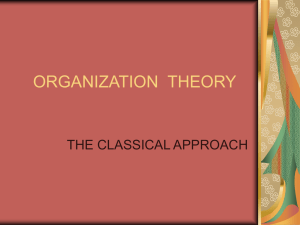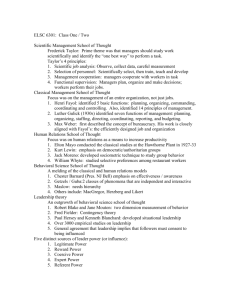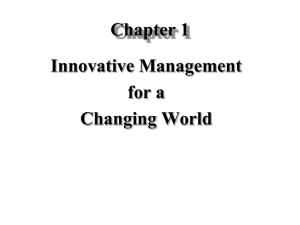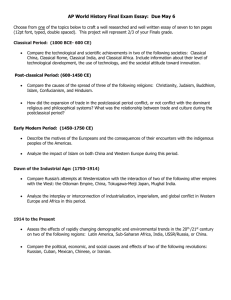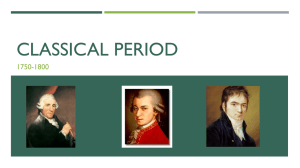Introduction To Pharmacy Management
advertisement
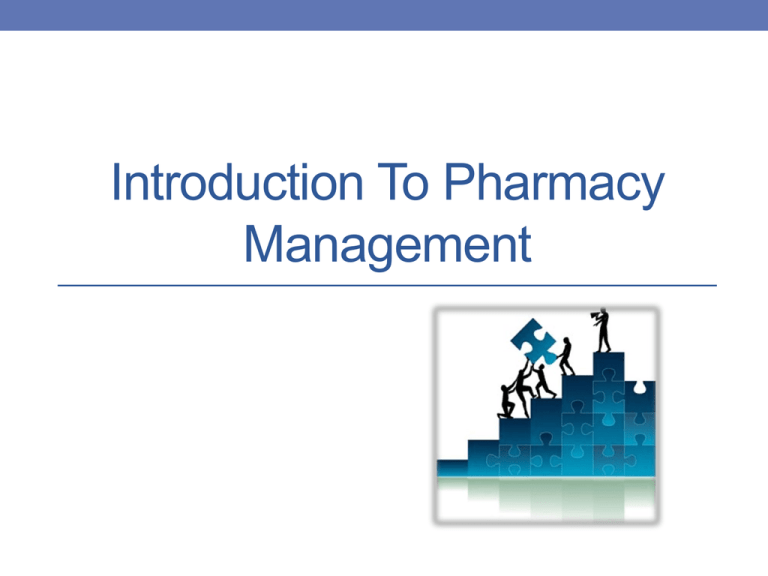
Introduction To Pharmacy Management Learning Objectives • Define the terms management and manager. • Compare and contrast management and leadership. • Compare and contrast classical views of management with modern views. • Describe the management process within the contexts of what managers do, resources they manage, and levels at which managers perform their roles. • Evaluate the need for a management perspective to better serve patients and improve outcomes to drug therapy What Is Management? • Manage: • To control the movement or behavior of • To lead or direct • Or to succeed in accomplishing What Is Management? • A process which brings together resources and unites them in such a way that, collectively, they achieve goals or objectives in the most efficient manner possible." Resources Goals What Is Management? • Managers are simply people who perform management activities • Anyone who has a task to accomplish or a goal to achieve is also a manager • Thus all pharmacists, regardless of their job responsibilities or position, should view themselves as managers! • Leadership? The Managerial Sciences Accounting Finance Economics • • • • • • • • • Determine optimal mix of labor and capital • Determine optimal output • Determine optimal hrs of business operation Keep the books Record financial transactions Manage cash flow Analysis of profability Human resources management • • • • • Conduct job analysis Hire personnel Orient and train personnel Appraise performance Motivate personnel Determine the financial needs Identify sources of capital Develop operating budget Invest profits Marketing Operations management • • • • • Design workflow • Perform quality assurance initiative Identify competitive advantage Identify target markets Evaluate promotional strategies Price goods and service Classical View of Management • Both Taylor and Fayol argued that all organizations, regardless of size or objective, had to perform a standard set of functions to operate efficiently. • Fayol's five management functions (planning, organizing, commanding, coordinating, and controlling) became widely accepted throughout the industrialized world. •. Classical View of Management • However, most of Taylor’s and Fayol’s work was developed based on the workplace conditions of the 18th, 19th and early 20th centuries. The great industries of those times focused primarily on the mass production of tangible goods • The role of administrators was to command and control their employees, and the role of workers was to carry out the tasks without question. Modern View of Management • Today, the number of people involved in the provision of services increased more than in the production of tangible goods as before. • In many cases, today’s administrators have less formal education and fewer technical skills than the people they are supervising. Modern View of Management The Management Process There are three dimensions of management: Activities that managers perform Resources that managers need Levels at which managers make decisions. The Management Process The Management Process: Management Activities • Planning • predetermining a course of action based on one's goals and objectives • internal and external environments • formal vs. informal plans The Management Process: Management Activities • Organizing • the arrangement and relationship of activities and resources necessary for the effective accomplishment of a goal or objective • what resources she needs, • how she will go about obtaining these resources, • when she will need to obtain them The Management Process: Management Activities • Leading • bringing about purposeful action toward some desired outcome. • It can take the form of actually doing something yourself or working with others to lead them to where you want your organization to be. The Management Process: Management Activities • Controlling • reviewing the progress that has been made toward the objectives that were set out in the plan. • This step involves not only determining what actually happened but also why it happened. • Performing quality-control checks The Management Process: Management Activities Plan Control Organize Lead The Management Process: Resources • Organizations and individuals must use resources efficiently to achieve their goals and objectives. Why? The Management Process: Resources Money information Material People Time Levels of Management • Self-management • Interpersonal management • Organizational management Levels of Management • pharmacist counseling a patient about a medication? • Pharmacist ensuring that every prescription is dispensed? • Pharmacist planning to add a new service to his chain community pharmacy chains? Managing Today’s Health Care Organizations • Health care organizations such as hospitals and pharmacies present a number of managerial challenges to administrators. • most health care workers are highly educated and skilled professionals. • Staff-level health care workers have more knowledge and expertise of their particular area than their administrators. Integrating Modern and Classical Views of Management • Modern views of management suggest that managers must adapt their management activities to their workers. • Today's manager in addition to classical management functions, needs to: • Energize. • Empower • Support • Communicate Integrating Modern and Classical Views of Management Energize • Have a vision and ideas about what would like to see their organizations become in the future. Empower • Provide the employees with training, resources, and advise and then let them get the job done Support Communicate • Letting their employees know when they have done a good job, as well as helping them to learn when things are not going well. • The corn stone of communications is trust. Why Should I Study Management? Management Practice and Medication Therapy Management • Good business practice and good patient care are not mutually exclusive. In fact, they are almost entirely mutually dependent. • Superior patient care and the implementation of clinical services are made possible by pharmacists who are skilled in management.
